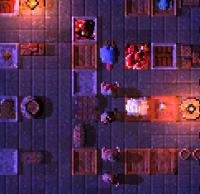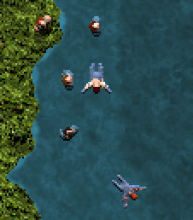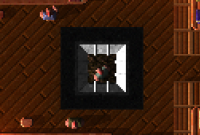Citizens
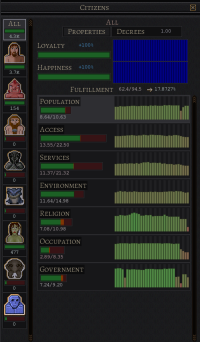
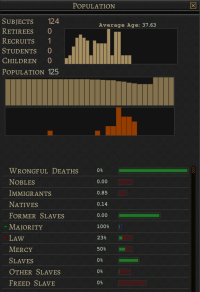
Citizens are the very lifeblood and backbone of a settlement. They will make up the largest group of subjects. Citizens can be of all eight races: the Amevias, Argonosh, Cantors, Cretonians, Dondorians, Garthimis, Humans, and Tilapis. With the guide of the player, they are responsible for performing tasks and jobs to keep the settlement running and growing stronger, including the making of resources. All citizens have pre-generated names, personalities, faces, traits, wants, needs and preferred climate. These wants and needs must be met and managed by the player, to keep everyone happy and working at maximum efficiency. Unhappy citizens may leave your settlement.
Each race is unique in what they excel at, and what they like and dislike. The player can click on a citizen to see their status and greater details about that individual. The player can check the amount of fulfillment and expectations of an individual, collectively as a race or all of the citizens in a settlement combined. Choosing a certain climate for your settlement will bring more immigrants of a race that matches a climate they prefer.
There are four classes of citizen: normal citizens, retirees, recruits, students. As the player's settlement expands and increases in quality, it will begin to see a rise in population through immigration. Note that population must be managed carefully, as if it's too low, there won't be enough people available to perform enough tasks and/or take employment, and if it's too high, the amount of food may not be enough to sustain everyone. Rising population will also increase standards and expectations of everyone.
Enemy citizens can attack the player's settlement at certain times. Citizens can be marked as a favorite, making them easier to track for the player. Certain races may also like or dislike other races, adding difficulty to a settlement made up of many races; most notably, all of them.
Mechanics
Working
Odd Jobbers
Odd jobbers are a default, pseudo-employment option for citizens and slaves. Any citizen or slave without an occupation will be an odd jobber by default. They will wander around the settlement and be available for doing certain tasks given by the player, such as cutting trees, collecting stone or cutting into mountains. If too many employees are chosen for jobs, the counter can actually go into the negatives.
It is advisable that players always have a decent amount of odd jobbers around the settlement, so they're always available to do much-needed tasks. If the amount of odd jobbers becomes too low, players can decrease the amount of employees working for certain buildings, and/or simply allow more immigrants to move in.
If there's not enough employees or odd jobbers to do something, a building or task will warn the player of this in red text.
Occupations
All citizens and slaves will wander around and do odd jobs, unless they are given employment in a building. By default, employees will be automatically assigned to any open occupations.
Regardless of what a person's job is, they will always take time off to fulfill their needs, such as sleeping, eating, maintaining their hygiene, drinking, using the bathroom, relaxing (if they can) and being near hearths.
Employed individuals will constantly maintain their job, always collecting and using resources, and/or making them if the job entails this. If there are no resources for someone to properly do their job, they will just stand around with nothing to do.
Immigration
Immigration is the process of citizens moving into your settlement. When overall population happiness is above 80%, immigrants will begin taking interest in moving into your settlement. The climate the settlement is in will dictate the amount of immigrants from a certain race to show up more frequently that favor said climate. For example, starting your settlement in a colder climate will have more Dondorians immigrating than if the climate was warmer, simply because that's the climate that Dondorians prefer.
Immigration can be controlled to the point where only a certain amount of people of a certain race can show up at once. Immigration should be managed carefully, because even though having your population grow leads to more things being done for the settlement, a population that's too high can empty your food storage faster than it can be replenished, leading to a hungry population. Immigrants have fewer expectations from your settlement than non-immigrants.
Cretonians, Dondorians, Humans, Garthimis, Amevias and Tilapis show up normally, but Argonosh and Cantors are not available for immigration.
How it works...
When a race's happiness is above 80%, the chance to gain immigrants occurs. This is seen at the right of the screen, where the small icons of the three races are. An example image of the Cretonians is shown above. The first number shows how many people of a race are in the settlement, while the second number below the first shows the number of potential immigrants. To let the immigrants in, simply double-click on the race icon. Once this is done, the immigrants will arrive from the side of the world and move to your settlement. By going through the Population GUI, you can customize the maximum number of potential immigrants that can come in at once, or you can set it to "auto", which automatically lets them in the second they're available. In the upper center area of the screen, there is a number that tells you how many immigrants have arrived recently, this number will be in a small box with a green arrow next to it. This part of the screen is shown in the animated image above.
Battle
When your settlement is developed enough, you will begin to face raids. To prepare for this, a training ground must be built, and the magnitude of training for the citizens should also be properly managed. If citizens are tough enough, they should be able to fight off raids, or at least weaken them. When training, citizens convert to recruits. Equipment can be provided to increase their performance.
Gallery
-
Working in a warehouse.
-
Citizens skinny dipping.
-
Many faces of the citizens.
-
A Cretonian trapped in an inescapable area.




